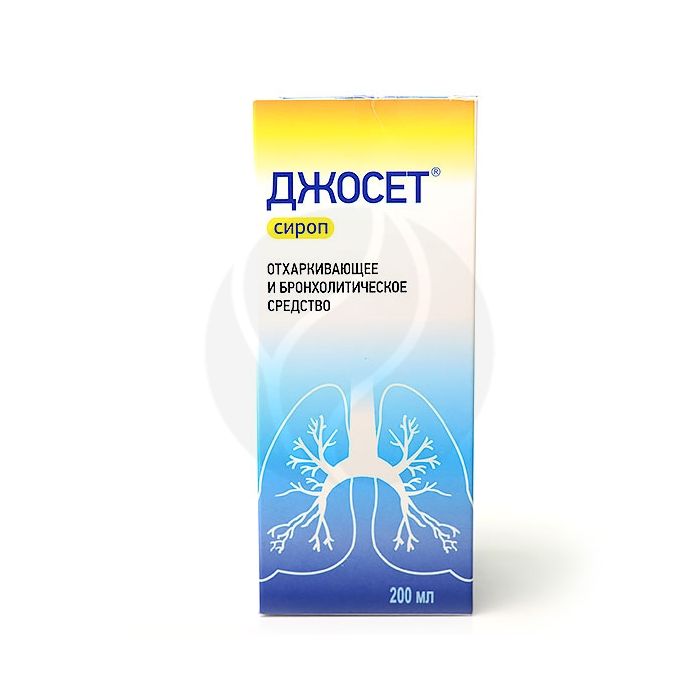Jocet syrup, 200ml
Expiration Date: 11/2025
Russian Pharmacy name:
Джосет сироп, 200мл
Acute and chronic bronchopulmonary diseases, accompanied by difficulty in sputum discharge:
-bronchial asthma;
-Chronical bronchitis;
- pulmonary emphysema;
- COPD;
-tracheobronchitis;
-pneumonia;
-pneumoconiosis;
-pulmonary tuberculosis.
Inside.
Children under 6 years old - 1 teaspoon (5 ml) 3 times a day; from 6 to 12 years old - 1-2 teaspoons (5-10 ml) 3 times a day.
Adults and children over 12 years old - 2 teaspoons (10 ml) 3 times a day.
Syrup 10 ml
salbutamol sulfate 1.205 mg (corresponds to 1 mg salbutamol)
bromhexine hydrochloride 2 mg
guaifenesin 50 mgmentol (levomenthol) 500 mcg
excipients: sodium methyl parahydroxybenzoate; sodium propyl parahydroxybenzoate; sucrose; propylene glycol; sodium saccharinate; sorbic acid; glycerol; citric acid monohydrate; sorbitol (non-crystallizing) liquid; sunset yellow dye; purified water
in dark glass or dark polyethylene terephthalate bottles of 100 ml, complete with a measuring cup; in a cardboard box 1 set.
-Hypersensitivity to the components of the drug;
-achyarrhythmia;
-myocarditis;
-aortic stenosis;
-decompensated diabetes mellitus;
-thyrotoxicosis;
-glaucoma;
-hepatic and / or renal failure;
- peptic ulcer of the stomach and duodenum in the acute phase;
-gastric bleeding;
-pregnancy;
-period of lactation (breastfeeding).
Carefully:
-diabetes;
-arterial hypertension;
- a history of gastric and duodenal ulceration;
- simultaneous use with antitussives, non-selective ?-adrenergic receptor blockers, MAO inhibitors.
pharmachologic effect
The combined drug has a bronchodilator, expectorant, mucolytic effect.
Salbutamol is a bronchodilator that stimulates ? 2 -adrenergic receptors of the bronchi, prevents or relieves bronchospasm.
Bromhexine is a mucolytic agent that has an expectorant and weak antitussive effect. Reduces the viscosity of sputum due to depolarization of acidic mucopolysaccharides and stimulation of secretory cells of the bronchial mucosa. Activates the cilia of the ciliated epithelium, improving the discharge of sputum.
Guaifenesin - reduces the surface tension and adhesive properties of sputum, increases the serous component of bronchial secretions, reduces the viscosity of sputum, activates the ciliary apparatus of the bronchi, facilitates the removal of sputum and promotes the transition of an unproductive cough into a productive one.
Menthol - has an antispasmodic effect, gently stimulates the secretion of the bronchial glands, has antiseptic properties, has a calming effect and reduces irritation of the mucous membrane of the respiratory tract.
Side effect
From the side of the central nervous system: headache, dizziness, increased nervous irritability, sleep disturbances, drowsiness, tremors, convulsions.
From the digestive system: nausea, vomiting, diarrhea, exacerbation of gastric ulcer and duodenal ulcer; very rarely - an increase in the activity of hepatic transaminases.
From the side of the cardiovascular system: tachycardia, decreased blood pressure, collapse.
From the urinary system: urine staining pink.
Allergic reactions: skin rash, urticaria, paradoxical bronchospasm.
Application during pregnancy and lactation
The use of the drug during pregnancy and lactation (breastfeeding) is contraindicated.
Application for violations of liver function
The use of the drug is contraindicated in liver failure.
Application for impaired renal function
The use of the drug is contraindicated in renal failure.
Application in children
Children under 6 years old - 1 tsp. (5 ml) 3 times / day; from 6 to 12 years old - 1-2 tsp. (5-10 ml) 3 times / day.
special instructions
Guaifenesin stains urine pink.
It is not recommended to take the drug with an alkaline drink.
Overdose
Symptoms: increased manifestations of side effects.
Treatment: symptomatic therapy.
Drug interactions
Beta2-adernomimetic drugs, theophylline and other xanthines, when used simultaneously with the drug, increase the likelihood of developing tachyarrhythmias.
MAO inhibitors and tricyclic antidepressants enhance the effect of salbutamol, can lead to a sharp decrease in blood pressure.
Diuretics and corticosteroids enhance the hypokalemic effect of salbutamol.
Simultaneous use with drugs containing codeine and other antitussives makes it difficult for the liquefied sputum to pass.
Bromhexine, which is part of the drug, promotes the penetration of antibiotics into the lung tissue.
It is not recommended to use concomitantly with nonselective ?-adrenoreceptor blockers.

